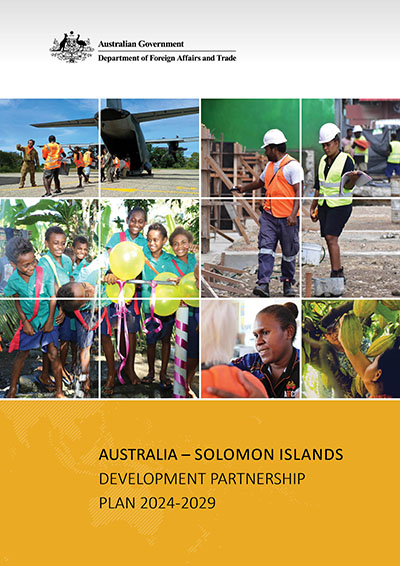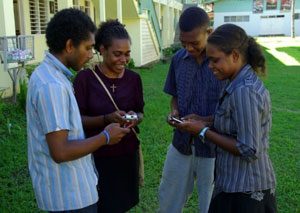-
2025-26 bilateral allocation [budget estimate]
-
$103.6 million
-
2025-26 total Australian ODA [budget estimate]
-
$170.9 million
-
2024-25 bilateral allocation [budget estimate]
-
$103.6 million
-
2024-25 total Australian ODA [budget estimate]
-
$171.2 million
-
2023-24 total Australian ODA [actual]
-
$159.9 million
Australia and Solomon Islands are family with interconnected futures – we share a region, an ocean, and a history of partnership. Australia is Solomon Islands' partner of choice – with the largest economic, development and security cooperation programs in Solomon Islands. Two-way trade between Solomon Islands and Australia continues to grow, supported by tariff free access into Australia. Both countries benefit from the Pacific Australia Labour Mobility (PALM) scheme. Australia and Solomon Islands also have substantial infrastructure cooperation.
Our development program in Solomon Islands is our third largest globally. Australia's Official Development Assistance (ODA) includes funding from bilateral, regional and global programs as well as other Government departments and agencies, including the Australian Federal Police. The Australian Department of Defence is a significant non-ODA contributor to Solomon Islands development. Australia's 2017 bilateral security treaty with Solomon Islands provides an enduring framework for security assistance, which most recently governed the multinational deployment of the Solomons International Assistance Force from 2021–2024.
Joint Objectives of the Australia – Solomon Islands development partnership
The goal, objectives, priorities, and programs in our development partnership were set in consultation with the Solomon Islands Government and are guided by the Solomon Islands'National Development Strategy (2016–2035) and Australia's International Development Policy.
The overarching goal for the Australia – Solomon Islands development partnership is supporting a stable and prosperous Solomon Islands. Three objectives support the realisation of that goal.
Objective 1: Inclusive economic growth, infrastructure, and job creation
Inclusive economic growth, infrastructure and job creation have been identified by the Solomon Islands Government as critical for their development and stability, and in turn its partnership with Australia. Australia will contribute directly to enhancing Solomon Islands' inclusive economic growth and job creation. We will focus on infrastructure, encouraging private sector growth, and providing workers with the skills they need for productive jobs, including in labour mobility schemes.
Objective 2: Investing in people, communities and links to Australia and the region
Investing in people and communities is essential for Solomon Islands economic and social development and is key for building human capital, resilience and wellbeing. Australia will enhance Solomon Islands resilience to shocks through investments in education, health, water and sanitation, gender equality and disability inclusion, and community linkages, including volunteers.
Objective 3: Improved stability, security, and resilience
Improved stability, security and resilience will enable Solomon Islands to grow its economy and improve the livelihoods and wellbeing of its people. Australia will continue to work with Solomon Islands on governance, climate change, disaster resilience and response and security and stability, including in emerging areas like cyber. This will include longstanding support for policing.
Climate Change
Solomon Islands is one of the most vulnerable countries in the world to the impacts of climate change, due to its geography, reliance on natural resources, and level of socio-economic development. Climate change is expected to exacerbate existing challenges to Solomon Islands' development across all sectors, with implications for the country's economy, human development, and security and stability. Climate change impacts will be felt most by women, people with disability and people experiencing other forms of marginalisation. Climate change will widen existing inequalities, including between rural and urban areas and across provinces due to factors such as remoteness and availability of natural resources.
Addressing the underlying vulnerabilities that drive the social and economic impacts of climate change will continue to be central to Australia's climate change response in Solomon Islands. We will integrate climate considerations across all our development investments in Solomon Islands and increase the number of investments that have a climate change objective. This will be complimented by targeted investments that will help Solomon Islands to access more climate finance, transition to renewable energy and build resilience to the impacts of climate change. We will partner with the Green Growth Institute to help Solomon Islands undertake national adaptation planning, build institutional capacity, and mobilise finance for priority adaptation projects.
We will support Solomon Islands' transition toward secure, resilient, reliable and accessible clean energy through initiatives such as the Tina River Hydropower Development Project and the Pacific Climate Infrastructure Financing Partnership. Australia will continue to assist Solomon Islands in addressing the impacts of climate change through regional programs, including the longstanding Climate and Oceans Support Program in the Pacific, Governance for Resilient Development in the Pacific program, the Pacific Insurance and Climate Adaptation Programme, the Climate Resilient by Nature program and the Australian Water Partnership. Australia is also contributing AUD100 million to the Pacific Resilience Facility, a Pacific-led initiative for climate finance and a longstanding regional priority.
Gender Equality, Disability and Social Inclusion (GEDSI)
Gender inequality is widespread and a serious impediment to development in Solomon Islands. High rates of gender-based violence persist and there are significant gender and disability barriers to accessing education and economic opportunities. Men hold most leadership positions in state, customary and faith-based institutions. Women, girls, and People with disability face additional challenges in accessing health and education services and achieving development gains.
Australia is Solomon Islands' largest partner supporting gender equality and disability inclusion and working closely with the Ministry of Women, Youth, Children and Family Affairs to assist the Solomon Islands Government to meet its objectives under the National Development Strategy 2016-2035 and Solomon Islands National Disability Inclusive Development Policy 2023-2030.
Australia has provided grant funding and technical assistance to people with disabilities in Solomon Islands and we will continue to explore ways to strengthen their voice and contributions to policy debate. We will continue to work with Solomon Islands Government, key women's organisations and other partners on three key priorities: ending violence against women, women's leadership and decision-making and women's rights and economic empowerment. Gender will also be mainstreamed and is essential to achieving the objectives of this DPP. We will do this through our bilateral programs and regional programs such as Pacific Women Lead. In accordance with Australia's International Development Policy and the Australian Government Department of Foreign Affairs and Trade's International Gender Equality Strategy, we will enhance support for gender equality by ensuring 80 per cent of investments address gender equality outcomes effectively and that all new investments more than AUD3 million include gender equality outcomes.



